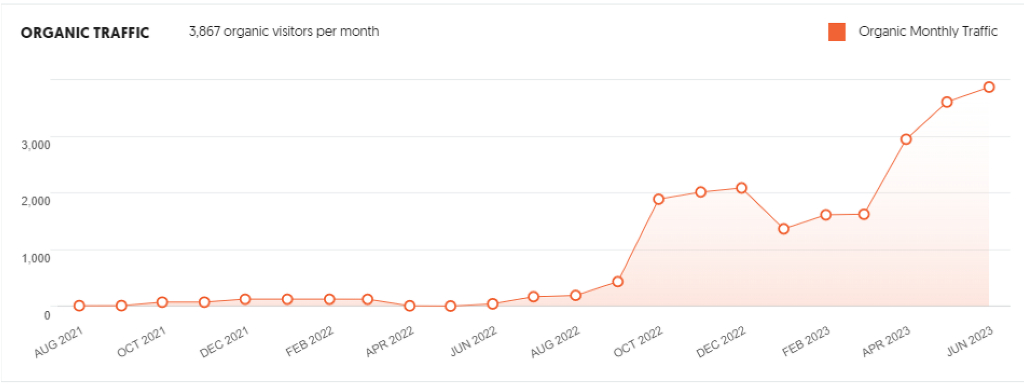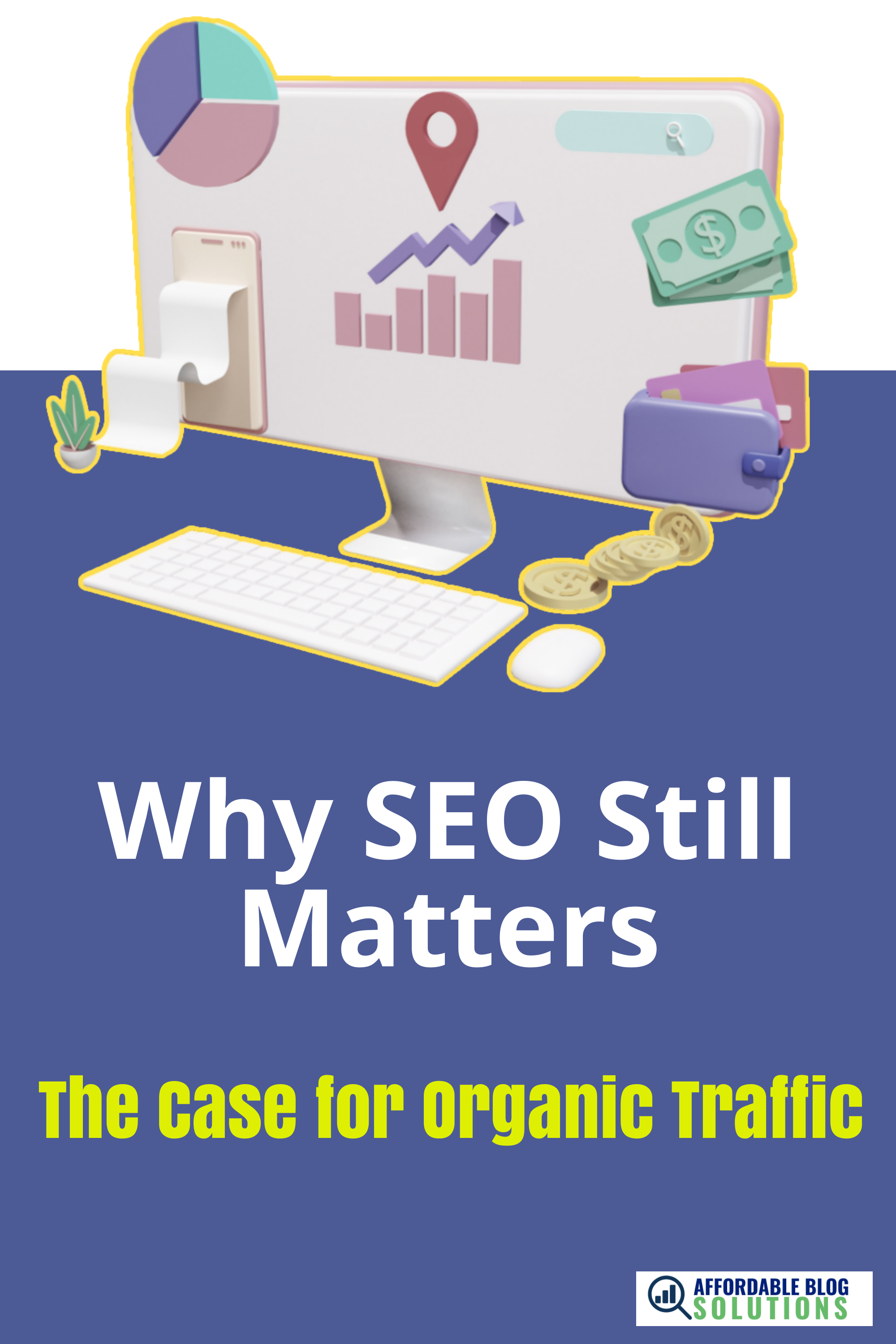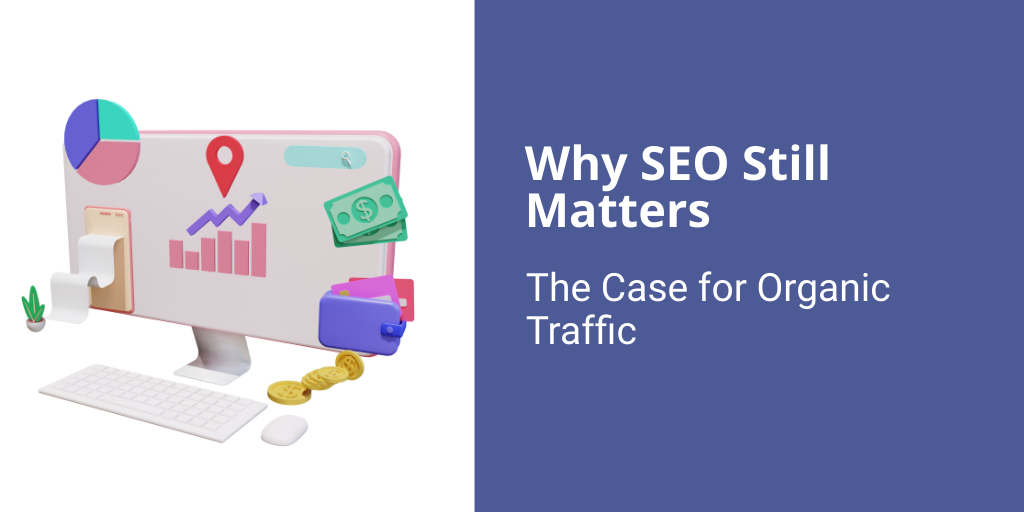Maintaining an online presence has become a prerequisite to remaining competitive in the digital age. However, it has grown beyond just having a website or social media pages; it’s about how well you can draw attention to your brand in the ever-expanding and increasingly competitive digital space.
I am a participant in quite a few affiliate programs that I believe can add value to your business. If you don’t know what that means, you can read more about it in my privacy policy.
Despite the rise of many marketing channels, SEO still matters. Why? Because it can effectively drive traffic to your website and amplify your digital presence.
What Does SEO Mean?
SEO (Search Engine Optimization) is the practice of optimizing your website’s content and structure to improve its visibility in search engine results pages (SERPs) for relevant queries.
It’s the linchpin that can enhance your brand’s visibility, create content that resonates with your target audience, and, ultimately, bring in organic traffic.
SEO is also about making your website appealing to search engines such as Google while also ensuring a better user experience for your visitors.
Organic Traffic Grows Your Business
Every website, small or large, needs traffic to attract leads and prospects to your business. Out of all the different types of traffic (such as direct, referral, and paid), digital marketers consider organic traffic the most valuable of all. We define organic traffic as traffic that lands on your website via way of search results that did not come from a paid ad.
Why is Organic Traffic So Critical to Your Business?
Organic traffic indicates that your content is relevant and valuable enough to rank high in SERPs without needing paid advertising. It means that you’re providing answers to the searcher’s questions, enhancing their user experience on your website, and building trust and credibility for your brand. Also, organic traffic usually has higher engagement and conversion rates, making it essential for your business.
Benefits of SEO
In a world where most online experiences start with a search engine, SEO is so important, and its benefits are manifold. Here are a few key advantages:

Increased visibility and brand awareness: SEO helps to boost your website’s ranking on SERPs. The higher the ranking, the more visibility your brand gets. This is because users often do not click past the first page of search results. So, higher visibility leads to greater brand awareness.
Higher website traffic and engagement: Good SEO practices improve the likelihood of attracting more users to your website. Moreover, by optimizing for relevant keywords and creating valuable content, you increase user engagement, keeping visitors on your site for longer.
Improved user experience and website usability: SEO isn’t just about search engines; it also focuses on the user experience. From ensuring your website loads quickly to making it mobile-friendly and easy to navigate, SEO enhances your website’s usability, making it more appealing to visitors.
Higher conversion rates and ROI: SEO targets users who are actively looking for your products and services online, leading to better conversion rates. Plus, since SEO involves inbound marketing strategies, it is more cost-effective than outbound methods, giving you a higher return on investment (ROI).
Discover new opportunities: Keyword research helps you understand searcher intent, which can reveal new areas of opportunity for your business. Good keyword research can reveal in-demand services you could add to retinue, new products, or product enhancements.
Ways SEO Helps You Reach More Customers
Whether it’s analyzing macro market trends or delving into the minutiae of consumer behavior, SEO is a valuable tool for understanding every desire, want, and need. Interpreting SEO data in various formats – whether spoken or written – delivers valuable insight into user intent and behavior.
Using sound SEO principles means you are creating a better user experience. Understanding the difference between a positive and negative user experience is crucial to the success of a website, and Google has become an expert at interpreting these distinctions.
Local SEO aims to enhance your online presence within a particular area, making it convenient for individuals to locate you and take the next step toward purchasing. Skilled SEO practitioners achieve this by optimizing your website and its content, incorporating local citations and backlinks, and adding your business to regional listings that are relevant to your industry and location.
SEO makes your brand visible during critical moments of the customer journey. An effective SEO strategy will ensure your brand receives more exposure during these pivotal engagements.
SEO results are quantifiable. With the right tools, measuring what’s working and what’s not is relatively straightforward. While it is a long game, and changes can take time to reveal results, your SEO efforts will impact your business growth over time as you better understand your market and demographics.
Does SEO Matter for Every Type of Business
You might be questioning whether SEO has any value for your business. Perhaps you work in a field with minimal competition and already occupy the #1 spot in search engine rankings. Or you may struggle to rank at all and are considering SEO alternatives to enhance your online visibility, such as PPC (Pay Per Click)
Regardless of your situation, if your company has a website, you need SEO to keep it relevant.
Here are a few industry and business types that can reap the benefits of SEO:
- Healthcare and Medical
- Industrial and Manufacturing
- Retail and eCommerce
- Home Services (plumbers, carpenters, insulation installers, cleaners)
- HVAC technicians
- Computer Repair
- And many more
You can’t control everything about your business, such as new competitors or consumer sentiment. However, you will always have control over SEO. When market forces change, you can adapt your SEO strategy to compensate and keep your competitive edge.
To some degree, this leverage will increase the volume of visitors to your website, directly impacting your online sales or lead generation and, subsequently, the revenue you generate from your online presence.
Elements of SEO
Several key components come together to build a successful strategy. Understanding the following elements will improve your SEO results to create a more substantial digital presence for your business:
Keywords
The bedrock of SEO is keywords. Searches type these terms into search engines when looking for information. Keyword research involves identifying the keywords your target audience uses and then optimizing your content around those keywords.
Doing this will increase the chances of your website appearing in search engine results when users perform those searches. Remember, good keyword research doesn’t just focus on high-volume terms but also long-tail keywords that can drive highly targeted traffic.
Off-Page SEO: While on-page SEO focuses on the elements you can control on your website, it involves techniques you use outside of your website to improve its ranking. This includes strategies like building high-quality backlinks, social media marketing, and influencer outreach. Off-page SEO is crucial as it tells search engines that your website is vital to others on the web, hence improving your site’s credibility and rankings.
Local SEO: For businesses that operate in a specific geographic area, local SEO is a must. This involves optimizing your website to attract traffic from location-based searches. This includes claiming your Google My Business listing, gathering positive customer reviews, and optimizing for local keywords.
Search Engine Marketing (SEM): While SEO focuses on earning traffic organically, Search Engine Marketing involves the promotion of websites by increasing their visibility in search engine results pages primarily through paid advertising. SEO and SEM can work together to enhance your online visibility and drive more traffic to your website.
Content
SEO and content marketing go hand in hand. The content on your website is what search engines index to determine where you rank in search results. Creating high-quality, engaging, and relevant content satisfies search engines and provides value to users, boosting your rankings. Regularly updating your site with fresh content, such as blog posts or articles, can also help improve your SEO performance.

Content is critical to SEO, but it’s also the type of content you use, which will depend on your audience:
-
Web Page Content refers to a website’s text, images, and multimedia elements. It includes everything from the written content on the homepage to product descriptions on an e-commerce store.
-
Videos: Videos can be used to share information, tell stories, promote products, or teach viewers how to do something. They are often shared on platforms like YouTube, embedded in web pages, or posted on social media.
-
Blogs: Blogs are regularly updated web pages managed by individuals or small groups. They are used to share personal experiences, provide insights on various topics, or discuss industry-related news. As previously explained, starting a blog can be a simple process and an excellent way to practice your writing and SEO skills.
-
Infographics: Infographics are visual representations of information. They’re used to simplify complex information or data and make it easier to understand at a glance.
-
Podcasts: Podcasts are digital audio files that can be streamed or downloaded. They are typically a series of spoken-word content about specific topics and are a popular form of entertainment and education.
-
Listicles: Listicles are articles that are formatted as a list. They break down information into digestible parts, making them easy to read. An example is “Top 10 Ways to Improve SEO.”
-
How-to Guides: These instructional content pieces guide readers through a series of steps to complete a specific task.
-
Whitepapers and e-books are in-depth reports on a specific topic, providing a detailed overview or analysis. E-books are digital books that can cover a wide range of topics. Both are often used in content marketing to generate leads.
-
Social Media Posts: These are content pieces shared on social media platforms like Facebook, Twitter, LinkedIn, and Instagram. They can be text posts, images, videos, or links to external content designed to engage the platform’s audience.
Each of these content types can be used differently to meet your digital marketing goals. Selecting the right mix depends on your audience, resources, and overall content strategy.
Understanding SEO means grasping how all these elements work together to improve a website’s visibility and rankings. It’s a holistic approach that can deliver significant benefits to any type of business, big or small when executed correctly.
SEO Challenges
Like any marketing strategy, SEO is not without its challenges. Here’s a quick breakdown of the obstacles you are most likely to encounter:
Constantly changing search engine algorithms: Google’s algorithm updates can change how you should use SEO. A single tweak of Google’s algorithm means that what worked yesterday might not work today. This makes SEO a constantly moving target, requiring marketers to stay ahead of the curve and on top of the SERPs.
Intense competition for top rankings: With every business understanding the importance of SEO, the competition for the top spots on SERPs is fierce. You’re not only competing with businesses in your industry but also with content and media platforms.
Difficulty in measuring ROI: While SEO brings many benefits, measuring the ROI of your SEO efforts can be challenging due to factors like fluctuating rankings, search engine algorithm updates, and the long-term nature of SEO.
Mastering the SEO Game: Rising Above the Challenges
Staying up-to-date with industry trends and best practices: SEO and your strategies constantly evolve. Following SEO experts, attending industry events, and regular learning are essential to keep your SEO knowledge fresh.
Focusing on long-term strategies rather than quick fixes: SEO isn’t about instant gratification. It takes time to see the results of your SEO efforts. Prioritizing long-term strategies, like building a solid content marketing plan or enhancing the technical aspects of your site, can yield more sustainable results.
Utilizing data and analytics to track progress and adjust strategies: SEO may be complicated, but the wealth of data available can help. Regularly reviewing your SEO performance using tools like Google Analytics can provide insights into what’s working and what needs to be improved.
Why SEO Still Matters in an AI World
In an era increasingly dominated by Artificial Intelligence (AI), the significance of SEO still holds. While AI has forever changed many aspects of digital marketing, the fundamental principles of SEO – understanding and meeting user intent, delivering high-quality content, and creating a website that offers a seamless user experience – still apply. Here’s why:
-
AI Enhances SEO: Rather than rendering SEO obsolete, AI has the potential to enhance SEO strategies. AI algorithms can analyze user behavior more accurately, providing deeper insights into what users search for and how they interact with online content. This allows businesses to optimize their websites more effectively, ensuring they meet the evolving needs of their users.
-
Visibility and Discoverability: Despite advancements in AI and changes in search algorithms, businesses still need to be easily discoverable and highly visible in search engine results. SEO strategies remain critical in achieving higher rankings on Search Engine Results Pages (SERPs), making it easier for potential customers to find your products and services.
-
Adapting to AI Algorithms: As search engines become more sophisticated with AI, they can better understand and interpret the content on a website. Consequently, it’s important to remember SEO strategies should adapt to these changes, focusing more on delivering high-quality, relevant content and less on exploiting algorithm quirks.
-
User Experience: No matter how advanced AI becomes, the importance of a good user experience will never fade. SEO is crucial for improving website usability and accessibility, enhancing the user experience, and therefore increasing engagement and conversions.
I liken AI results in the SERPs to Google Snippets. Doomsayers were happy to proclaim the death of SEO when snippets arrived on the scene. After all, if people could get their answers directly from the search page, why click through to a website?

In reality, Snippets did not negate SEO. At best, they had minimal impact. While certain types of informational content may have taken a traffic hit, SEO continued to deliver value to all businesses, still does, and will continue to do so.
With the addition of AI, SEO isn’t becoming less important – instead, it’s evolving. Successful businesses will be those that can adapt their SEO strategies to leverage the power of AI while still prioritizing visibility, relevance, and user experience.
Tips to Make SEO Work and Attract Organic Search Traffic
To make the most out of your SEO strategy, you should adopt a few good habits when creating your content:
Conduct a website audit to identify areas for improvement: A comprehensive website audit is the first step to any effective SEO strategy. This audit will examine your website’s structure, content, and current rankings to identify strengths and weaknesses.
Create high-quality, relevant content: Quality content is the backbone of good SEO. Search engines reward sites that offer valuable, unique, and relevant content. By understanding your audience and their needs, you can create content that attracts, engages, and retains users.
Optimizing website structure and navigation: A well-structured website is favored by both search engines and users. Ensure that your site has a clear, logical structure, is easy to navigate, and provides a good user experience.
Building high-quality backlinks: In the eyes of search engines, backlinks serve as endorsements for your website. The more high-quality sites link to yours, the better your site’s reputation and rankings.
Utilizing social media and other channels to promote content: While SEO is crucial, it’s also beneficial to use other channels like social media, email marketing, and content marketing to promote your content and drive traffic to your website.
Start Improving Your SEO Today
In today’s digitally dominated world, SEO still matters and will continue to do so. Whether you’re a local business looking to attract customers in your area (local SEO) or a large enterprise aiming to expand your reach, SEO is the best way to enhance your online visibility in the SERP (search engine results page), drive more organic traffic, and ensure your business can be found online.
Remember, SEO isn’t a one-time effort but a continuous process that requires consistent attention and adaptation. But with patience, persistence, and adherence to best practices, you can master the SEO game, outshine your competitors in SERPs, and maximize the returns on your digital marketing efforts.
